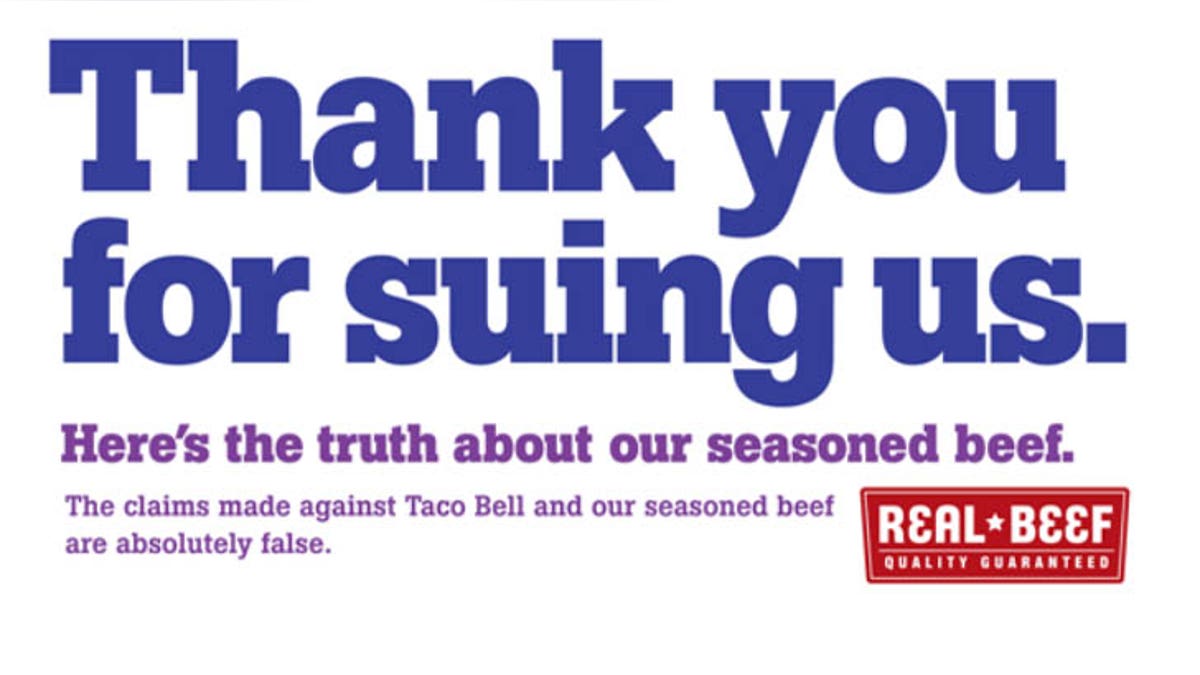
"Thank you For Suing Us. Here's The Truth About Our Seasoned Beef."
That statement is now headlining Taco Bell's new aggressive advertising campaign Friday that fights back against the lawsuit accusing the fast food chain of misleading customers about the quantity of beef in its beef tacos.
The full-page print ads in the Wall Street Journal, USA Today, New York Times and other papers as well as online ads launched to "set the record straight." Each ad goes as far as outlining the meats coveted "secret" ingredients.
The company says that its beef is made up of 88 percent beef, and 12 percent secret recipe. Of that secret 12 percent, 4 percent is made up of their Mexican spices and flavors, 3 percent is water to keep it moist and juicy, and five percent is oats, caramel oats, and much more.
The class-action lawsuit was filed late last week in federal court in California. It claimed Taco Bell falsely advertised its products as "beef." The suit alleges that the fast-food chain actually uses a meat mixture in its burritos and tacos that contains binders and extenders and does not meet requirements set by the U.S. Department of Agriculture to be labeled "beef."
The lawsuit, filed by the Alabama law firm Beasley, Allen, Crow, Methvin, Portis & Miles, doesn't specify what percentage of the mixture is meat. But the firm's attorney Dee Miles said the firm had the product tested and found it contained less than 35 percent beef. The firm would not say who tested the meat or give any other specifics of the analysis.
When customers bite into a crunchy beef taco, they are actually munching on water, wheat oats, soy lecithin, maltodrextrin, anti-dusting agent and modified corn starch, the lawsuit claims.
The company has released a video starring the President of Taco Bell Greg Creed in which he defends the beef.
"We stand behind the quality of our seasoned beef 100 percent," he says. "Our beef is 100 percent USDA inspected just like the quality beef you buy in a supermarket and prepare in your home."
Creed goes on to say that just like your homemade Chili, the company adds its own recipe of seasoning and spices to give the beef flavor and texture.
Still, the company couldn't ignore the case after it made headlines and quickly spread online.
"This is one of those things that could be a humongous threat to their brand, which is why Taco Bell has taken such an aggressive stance on this," said Marc Williams, an attorney at Nelson Mullins Riley & Scarborough with extensive experience in fast-food litigation.
The case, Williams said, is thin in potential legal liability. Lawyers would have to prove that most consumers expect and believe they are getting something other than what Taco Bell actually serves. Most fast-food customers, he said, realize taco meat has other ingredients besides beef. And the lawsuit cites U.S. Department of Agriculture guidelines for labeling ground beef, which don't apply to restaurants.
The USDA's rules apply to meat processors -- the companies Taco Bell buys its meat from. Tyson Foods Inc., the company's largest meat supplier, said it mixes and cooks the meat at three USDA-inspected plants and that the meat is tested daily to make sure it meets requirements.
Claims of false advertising typically are regulated by the Federal Trade Commission.
Industry and public relations executives say it's critical for the company to respond forcefully to head off damage to its reputation. However, most say it's unlikely to seriously dent Taco Bell's image or business, which serves 35 million people a week.
"I don't think the impact is going to be all that large," said Janney Capital Markets analyst Mark Kalinowski. "It lacks the sensationalism of (other cases)."
Wendy's, for example, had its image temporarily tarnished by a woman who falsely claimed that she found part of a finger in her chili. And it's not the huge recalls that have stung some food makers.
Other restaurants have faced similar cases without being hurt much.
Rubio's Restaurants Inc. faced a lawsuit in 2006 when a disgruntled customer felt that it was misleading people by selling lobster tacos and burritos at its Mexican restaurant chain made with langostino, a different species from the classic Maine lobster. The company settled the case by offering California customers coupons.
Yum Brands Inc., Taco Bell's parent company, would not say if there has been any impact on its sales, citing a quiet period before its earnings release on Feb. 3.
Based on reporting by the Associated Press.
Follow us on twitter.com/foxnewslatino
Like us at facebook.com/foxnewslatino








































